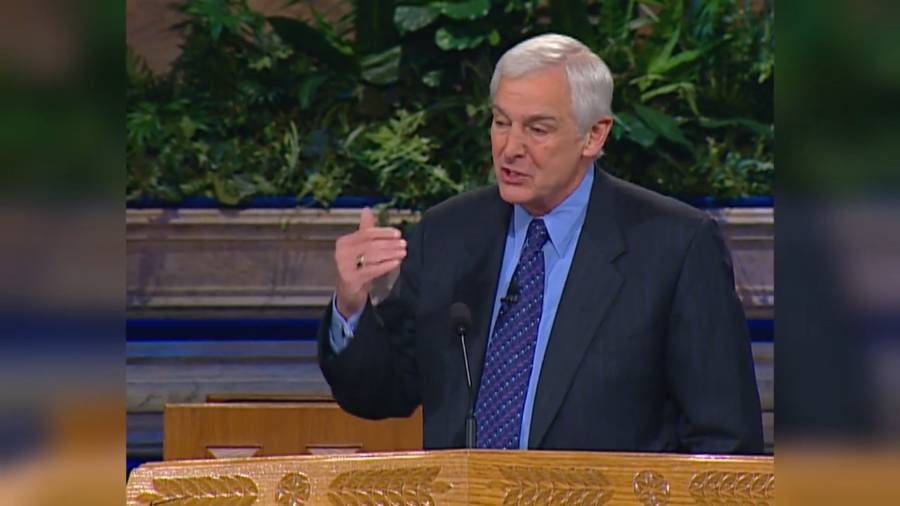
Every day at Turning Point, we receive stacks of letters from our readers and listeners, and we take each one seriously. I’m grateful that our friends around the world feel they can confide in our counsel and prayers. A large number of these letters are written with tears as people grapple with death, dying, and the loss of loved ones. Some readers have lost the dearest person on earth to them. Some have faced the sudden death of a spouse or child or grandchild, and the pain is overwhelming. We need reassurance we’ll see our loved ones again in a land where we’ll never say goodbye.
With the authority of the Word of God and the Resurrection of Jesus Christ, I want to reassure you that heaven is a place where we’ll never say goodbye. The Bible says that in our eternal home, “God will wipe away every tear from their eyes; there shall be no more death, nor sorrow, nor crying. There shall be no more pain, for the former things have passed away” (Revelation 21:4).
The apostle Paul told us not to “sorrow as others who have no hope. For if we believe that Jesus died and rose again, even so God will bring with Him those who sleep in Jesus… And thus we shall always be with the Lord” (1 Thessalonians 4:13–14, 17).
As it relates to our loved ones in Christ, our goodbyes will become hellos, our separation will turn into a reunion, and our fellowship will never cease. Someone once said, “Unbelievers only meet to part again; Christians only part to meet again.” In heaven, we’ll never have to say a final goodbye to anyone at any time.
Never Discount True Grief
That said, we’re now living in a world of sin, sorrow, and separation. When we lose those dear to us—no matter how vibrant their testimony—we have natural grief that shouldn’t be discounted. It’s normal to mourn with broken hearts and sadness. Even in the book of Acts in the immediate aftermath of the Resurrection of Jesus, there was sorrow when a loved one departed. When Stephen was slain, those who loved him buried him with great lamentation (Acts 8:2). In the next chapter, a godly woman named Dorcas passed away. When Peter visited the scene, the other widows were weeping. They sorrowfully showed him the tunics and garments she had made.
In Acts 20, Paul met with church leaders from Ephesus, telling them they would never again see his face on earth. As he said goodbye to them, they were inconsolable. “They all wept freely, and fell on Paul’s neck and kissed him, sorrowing most of all for the words which he spoke, that they would see his face no more” (Acts 20:37–38).
If we didn’t love so deeply, we wouldn’t hurt so badly. Whether our loved one is taken suddenly in an accident or unexpected medical crisis or whether they slip away from a lingering illness, the pain can feel unendurable. That’s because we’re living on this side of glory, in a world where we’re always saying goodbye.
Never Become Stranded in True Grief
We don’t want to discount the grief, but we also don’t want to become stranded there. Perhaps you’ve heard of the grief cycle. Psychologists tell us that in times of catastrophic loss, we experience deep emotions that we must process. The emotions come in waves or cycles—denial, isolation, anger, questioning, guilt, depression, and finally acceptance. Dr. Elisabeth Kubler–Ross formulated the basic model for the grieving process in the 1960s, but she taught it with flexibility, knowing everyone deals with things differently. Grief is not a conveyor belt. God created us with deep feelings and tender love, and we have to personally work our way through our sorrows with the truths of His Word. But how important it is not to become stuck in the middle of the grief process. I don’t believe the Lord—or our loved ones in heaven—would want us to spend years in denial, or isolation, or anger, or asking “what ifs,” or in depression.
In the Upper Room, Jesus prepared His disciples for His approaching departure by telling them,
“Let not your heart be troubled… If I go and prepare a place for you, I will come again and receive you to Myself; that where I am, there you may be also…. I am going away… If you loved Me, you would rejoice…. These things I have spoken to you, that My joy may remain in you (John 14:1–3, 28; 15:11).
Just as Jesus helped His disciples deal with their grief in the Upper Room, He’s ready to help you. He and His Holy Spirit are Comforters. He doesn’t want you to live in unhealed pain or endless grief. Our Lord is the “God of all comfort, who comforts us in all our tribulation, that we may be able to comfort those who are in any trouble, with the comfort with which we ourselves are comforted by God” (2 Corinthians 1:3–4).
Never Forget How Jesus Has Solved True Grief
How, then, does God comfort us in our grief? One way is by flooding our minds with the knowledge of a land where we’ll never say goodbye. You can open the Bible to any page and find it written from the perspective of eternity. Our God is from everlasting to everlasting, and His Word is forever established in heaven. The Word of God is His revelation of endless truth that we can learn nowhere else.
According to Psalm 23, goodness and mercy will follow us all the days of our lives, and we will live in the house of the Lord forever (verse 6). Jesus said the Father’s house has many mansions. Psalm 16 says about heaven, “In Your presence is fullness of joy; at Your right hand are pleasures forevermore.”
In Luke 16, Jesus told of a beggar who died and was carried by the angels into heaven where he enjoyed instant fellowship with the patriarch Abraham. The apostle Paul, who briefly visited Paradise during a special revelation (see 2 Corinthians 12:4), was so eager to get back there he considered departing to “be with Christ” as “far better” than staying alive on earth (Philippians 1:23). He said he’d rather “be absent from the body and to be present with the Lord” (2 Corinthians 5:8).
The last two chapters of the Bible give us a tour of New Jerusalem and provide the Bible’s best description of our eternal home. Revelation 21 and 22 tell us what will be in heaven and what will not be there. There are some nevers to encourage us—never a tear there, never a pain, never a sorrow, and no more separation. No more sin and no more night (see Revelation 21:4, 25, 27).
Oh, how we long for our loved ones to have the hope of Jesus! The teachings of the Bible about heaven should motivate us to pray and work for the salvation of family members and friends. And these teachings should comfort us in our darkest moments.
That’s what happened with Edwin and Anzentia Chapman, nineteenth–century Methodist workers in the American Midwest. The Chapmans poured their lives into an itinerant ministry of church planting. One day in 1887, the whole family was traveling home from an evangelistic tour of Kansas. The children passed the time by playing with some coins, but tragedy struck when little Eva, 7, swallowed some of them. The coins caused serious internal problems, which worsened from day to day. Five days after swallowing the coins, Eva announced she was going to heaven. She gave away her toys and childhood treasures to her siblings, then got into her brother’s lap and sang a song. Then she passed away and was buried in Kansas. Returning home, her grief–stricken mother wrote a hymn in her memory, and it became very popular in its day.
With friends on earth
we meet in gladness,
While swift the moments fly,
Yet ever comes the thought of sadness,
That we must say, “Goodbye.”
We’ll never say goodbye in Heaven,
We’ll never say goodbye.
For in that land of joy and song,
We’ll never say goodbye.1
People of every generation face sorrow every day, and there’s no sorrow like a sad goodbye. None of us are exempt. But there’s no joy like that of the Savior who rose again and who promises that we’ll inherit a land where we’ll never again say goodbye. Our farewells will become hellos. Instead of “So long,” we’ll say, “Good to see you!” And our heartaches will be forgotten amid our hallelujahs.
1http://www.hymntime.com/tch/htm/w/n/s/wnsgobye.htm
This article was first published in the August 2015 issue of Turning Points Magazine & Devotional. Request your complimentary subscription today!
















